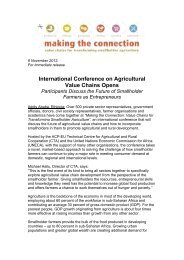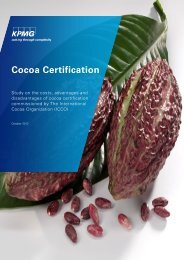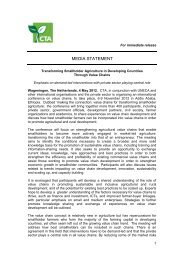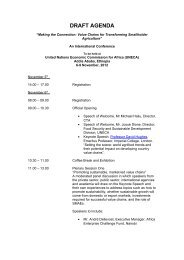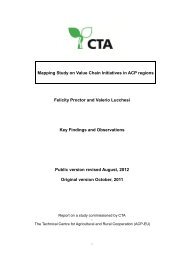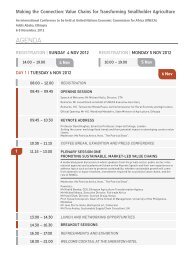Title: Farmer organizations in value chain policy making Chair: Mr ...
Title: Farmer organizations in value chain policy making Chair: Mr ...
Title: Farmer organizations in value chain policy making Chair: Mr ...
You also want an ePaper? Increase the reach of your titles
YUMPU automatically turns print PDFs into web optimized ePapers that Google loves.
<strong>Title</strong>: <strong>Farmer</strong> <strong>organizations</strong> <strong>in</strong> <strong>value</strong> cha<strong>in</strong> <strong>policy</strong> mak<strong>in</strong>g<strong>Chair</strong>: <strong>Mr</strong> Stephen Muchiri, CEO, Eastern Africa <strong>Farmer</strong>s' Federation (EAFF)<strong>Farmer</strong>s’ <strong>organizations</strong> have a key role to play <strong>in</strong> advocat<strong>in</strong>g for change <strong>in</strong> policies and<strong>in</strong>stitutional arrangements to ensure that such arrangements meet the needs of their membership,specifically smallholders. However, <strong>organizations</strong> often lack access to the evidence needed todevelop proactive proposals to <strong>in</strong>fluence <strong>policy</strong>. An <strong>in</strong>terface between farmers’ <strong>organizations</strong> andnational and <strong>in</strong>ternational researchers facilitates better evidence to support <strong>policy</strong> proposals andto provide research results on topics that matter most to farmers’ <strong>organizations</strong> and theirmembers.The Empower<strong>in</strong>g Smallholder <strong>Farmer</strong>s <strong>in</strong> the Markets (ESFIM) 1 programme generates demanddrivenaction research supportive of the <strong>policy</strong> priorities of farmers’ <strong>organizations</strong>. It presentlystrengthens the advocacy capacities of national farmers’ organisations <strong>in</strong> ten countries: Bén<strong>in</strong>,Bolivia, Costa Rica, Kenya, Madagascar, Malawi, Perú, Philipp<strong>in</strong>es, Uganda and Uruguay. Theprogramme aims for the development of public and private sector policies and <strong>in</strong>stitutionalarrangements that enable smallholder access to and participation <strong>in</strong> markets and thus contributeto the wider objectives of poverty reduction and food security.The objectives of this breakout session are to:Share first-hand experiences of national farmers’ <strong>organizations</strong> on how they haveidentified and used research evidence to formulate feasible, evidence-based propositionsfor changes <strong>in</strong> policies and <strong>in</strong>stitutional arrangements that empower smallholders andtheir <strong>organizations</strong> <strong>in</strong> local, regional and <strong>in</strong>ternational markets.Present the key lessons learned through such processes: what works well, what works lesswell, and whyExplore how such processes might be strengthened and scaled-up1 ESFIM is co-funded by IFAD, the European Alliance on Agricultural Knowledge for Development European Economic InterestGroup<strong>in</strong>g (AGRINATURA-EEIG), the Dutch M<strong>in</strong>istry of Economy, Agriculture and Innovation, Agriterra and CTA(www.esfim.org).
Speakers will <strong>in</strong>clude:<strong>Mr</strong> Giel Ton, AGRINATURA/LEI Wagen<strong>in</strong>gen University and Research Centre,Netherlands.Ms Meike Carmen Willems, Development Cooperation Unit, Junta Nacional de Café(JNC), Peru<strong>Mr</strong> John Mutunga, Kenyan National Federation of Agricultural Producers (KENFAP)<strong>Mr</strong> Hajasoanir<strong>in</strong>a Rakotomandimby, Coalition Paysanne de Madagascar, Madagascar<strong>Mr</strong> Alexander Chikapula, National Smallholder <strong>Farmer</strong>s Association of Malawi,Malawi



